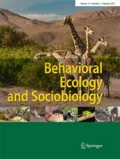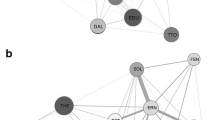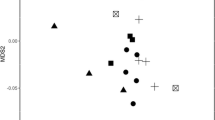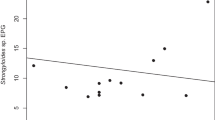Abstract
Increased risk of pathogen transmission through proximity and contact is a well-documented cost of sociality. Affiliative social contact, however, is an integral part of primate group life and can benefit health. Despite its importance to the evolution and maintenance of sociality, the tradeoff between costs and benefits of social contact for group-living primate species remains poorly understood. To improve our understanding of this interplay, we used social network analysis to investigate whether contact via association in the same space and/or physical contact measured through grooming were associated with helminth parasite species richness in a community of wild chimpanzees (Pan troglodytes schweinfurthii). We identified parasite taxa in 381 fecal samples from 36 individuals from the Kasekela community of chimpanzees in Gombe National Park, Tanzania, from November 1, 2006, to October 31, 2012. Over the study period, eight environmentally transmitted helminth taxa were identified. We quantified three network metrics for association and grooming contact, including degree strength, betweenness, and closeness. Our findings suggest that more gregarious individuals—those who spent more time with more individuals in the same space—had higher parasite richness, while the connections in the grooming network were not related to parasite richness. The expected parasite richness in individuals increased by 1.13 taxa (CI: 1.04, 1.22; p = 0.02) per one standard deviation increase in degree strength of association contact. The results of this study add to the understanding of the role that different types of social contact play in the parasite richness of group-living social primates.
Significance statement
Parasite infections reveal costs of group living among wild animal populations. We studied the relationship between sociality and parasite transmission by assessing whether variation in social behavior among wild chimpanzees is associated with the number of unique helminth parasites detected in individual fecal samples. Our findings revealed that associating in the same shared space, but not grooming contact, is related to higher parasite richness. These findings improve our understanding of the complex interplay of parasitism and sociality with important implications for parasite transmission patterns in host species with flexible grouping patterns.


Similar content being viewed by others
References
Akinyi MY, Tung J, Jeneby M, Patel NB, Altmann J, Alberts SC (2013) Role of grooming in reducing tick load in wild baboons (Papio cynocephalus). Anim Behav 85:559–568. https://doi.org/10.1016/j.anbehav.2012.12.012
Altizer S, Nunn CL, Thrall PH et al (2003) Social organization and parasite risk in mammals: integrating theory and empirical studies. Annu Rev Ecol Evol S 34:517–547. https://doi.org/10.1146/annurev.ecolsys.34.030102.151725
Anderson RC (2000) Nematode parasites of vertebrates: their development and transmission. Wallingford, Oxon: CABI Publishing. https://doi.org/10.1079/9780851994215.0000
Benavides JA, Huchard E, Pettorelli N, King AJ, Brown ME, Archer CE, Appleton CC, Raymond M, Cowlishaw G (2012) From parasite encounter to infection: multiple-scale drivers of parasite richness in a wild social primate population. Am J Phys Anthropol 147:52–63. https://doi.org/10.1002/ajpa.21627
Benmansour B, Ben Hassine K (1998) Preliminary analysis of parasitic copepod species richness among coastal fishes of Tunisia. Ital J Zool 65:341–344. https://doi.org/10.1080/11250009809386844
Boesch C, Boesch-Achermann H (2000) The chimpanzees of the Taï Forest: behavioural ecology and evolution. Oxford: Oxford University Press
Brooks ME, Kristensen K, van Benthem KJ, Magnusson A, Berg CW, Nielsen A, Skaug HJ, Mächler M, Bolker BM (2017) glmmTMB balances speed and flexibility among packages for zero-inflated generalized linear mixed modeling. R J 9:378–400. https://doi.org/10.32614/rj-2017-066
Brooks ME, Kristensen K, Darrigo MR, Rubim P, Uriarte M, Bruna E, Bolker BM (2019) Statistical modeling of patterns in annual reproductive rates. Ecology 100:e02706. https://doi.org/10.1002/ecy.2706
Cairns SJ, Schwager SJ (1987) A comparison of association indices. Anim Behav 35:1454–1469. https://doi.org/10.1016/S0003-3472(87)80018-0
Collins A (2003) Health guidelines for visiting researchers in Gombe National Park to minimize risk of disease transmission among primates. Pan Africa News 10:1–3. https://doi.org/10.5134/143425
Cooper N, Kamilar JM, Nunn CL (2012) Host longevity and parasite species richness in mammals. PLoS ONE 7:e42190. https://doi.org/10.1371/journal.pone.0042190
Côté IM, Poulin R (1995) Parasitism and group size in social animals: a meta-analysis. Behav Ecol 6:159–165. https://doi.org/10.1093/beheco/6.2.159
Crockford C, Wittig RM, Langergraber K, Ziegler TE, Zuberbühler DT (2013) Urinary oxytocin and social bonding in related and unrelated wild chimpanzees. Proc R Soc B 280:20122765. https://doi.org/10.1098/rspb.2012.2765
Csárdi G, Nepusz T (2006) The igraph software package for complex network research. InterJ Complex Syst 1695. http://igraph.sf.net. Accessed 12 May 2017
Dallas TA, Han BA, Nunn CL, Park AW, Stephens PR, Drake JM (2019) Host traits associated with species roles in parasite sharing networks. Oikos 128:23–32. https://doi.org/10.1111/oik.05602
De Nys HM, Calvignac-Spencer S, Thiesen U, Boesch C, Wittig RM, Mundry R, Leendertz FH (2013) Age-related effects on malaria parasite infection in wild chimpanzees. Biol Lett 9:20121160. https://doi.org/10.1098/rsbl.2012.1160
Ezenwa VO (2004) Host social behavior and parasitic infection: a multifactorial approach. Behav Ecol 15:446–454. https://doi.org/10.1093/beheco/arh028
Ezenwa VO, Etienne RS, Luikart G, Beja-Pereira A, Jolles AE (2010) Hidden consequences of living in a wormy world: nematode-induced immune suppression facilitates tuberculosis invasion in African buffalo. Am Nat 176:613–624. https://doi.org/10.1086/656496
Farine DR (2017) A guide to null models for animal social network analysis. Methods Ecol Evol 8:1309–1320. https://doi.org/10.1111/2041-210X.12772
File SK, McGrew WC, Tutin CE (1976) The intestinal parasites of a community of feral chimpanzees, Pan troglodytes schweinfurthii. J Parasitol 62:259–261. https://doi.org/10.2307/3279280
Foerster S, McLellan K, Schroepfer-Walker K, Murray CM, Krupenye C, Gilby IC, Pusey AE (2015) Social bonds in the dispersing sex: partner preferences among adult female chimpanzees. Anim Behav 105:139–152. https://doi.org/10.1016/j.anbehav.2015.04.012
Ghai RR, Fugère V, Chapman CA, Goldbery TL, Davies TJ (2015) Sickness behaviour associated with non-lethal infections in wild primates. Proc R Soc B 282:20151436. https://doi.org/10.1098/rspb.2015.1436
Gilardi KV, Gillespie TR, Leendertz FH, Macfie EJ, Travis DA, Whittier CA, Williamson EA (2015) Best practice guidelines for health monitoring and disease control in great ape populations. IUCN SSC Primate Specialist Group. https://doi.org/10.2305/IUCN.CH.2015.SSC-OP.56.en
Gilby IC, Wrangham RW (2008) Association patterns among wild chimpanzees (Pan troglodytes schweinfurthii) reflect sex differences in cooperation. Behav Ecol Sociobiol 62:1831–1842. https://doi.org/10.1007/s00265-008-0612-6
Gillespie TR (2006) Noninvasive assessment of gastrointestinal parasite infections in free-ranging primates. Int J Primatol 27:1129–1143. https://doi.org/10.1007/s10764-006-9064-x
Godfrey SS (2013) Networks and the ecology of parasite transmission: a framework for wildlife parasitology. Int J Parasitol Parasites Wildl 2:235–245. https://doi.org/10.1016/j.ijppaw.2013.09.001
Gómez JM, Nunn CL, Verdú M (2013) Centrality in primate-parasite networks reveals the potential for the transmission of emerging infectious diseases to humans. P Natl Acad Sci USA 110:7738–7741. https://doi.org/10.1073/pnas.1220716110
Goodall J (1986) The chimpanzees of Gombe: patterns of behavior. Boston: Belknap Press of the Harvard University Press
Grear DA, Luong LT, Hudson PJ (2013) Network transmission inference: host behavior and parasite life cycle make social networks meaningful in disease ecology. Ecol Appl 23:1906–1914. https://doi.org/10.1890/13-0907.1
Griffin RH, Nunn CL (2012) Community structure and the spread of infectious disease in primate social networks. Evol Ecol 26:779–800. https://doi.org/10.1007/s10682-011-9526-2
Hartig F (2020) DHARMa: residual diagnostics for hierarchical (multi-level/mixed) regression models. R package version 0.3.3.0. https://CRAN.R-project.org/package=DHARMa. Accessed 9 Dec 2020
Hernandez AD, Sukhdeo MVK (1995) Host grooming and the transmission strategy of Heligmosomoides polygyrus. J Parasitol 81:865–869. https://doi.org/10.2307/3284031
Hernandez AD, Poole A, Cattadori IM (2013) Climate changes influence free-living stages of soil-transmitted parasites of European rabbits. Glob Change Biol 19:1028–1042. https://doi.org/10.1111/gcb.12106
Hillegass MA, Waterman JM, Roth JD (2010) Parasite removal increases reproductive success in a social African ground squirrel. Behav Ecol 21:696–700. https://doi.org/10.1093/beheco/arq041
Holt-Lunstad J, Smith TB, Layton JB (2010) Social relationships and mortality risk: a meta-analytic review. PLoS Med 7:e1000316. https://doi.org/10.1371/journal.pmed.1000316
Ilmonen P, Taarna T, Hasselquist D (2000) Experimentally activated immune defence in female pied flycatchers results in reduced breeding success. Proc R Soc Lond B 267:665–670. https://doi.org/10.1098/rspb.2000.1053
Johnson PTJ, Preston DL, Hoverman JT, LaFonte BE (2013) Host and parasite diversity jointly control disease risk in complex communities. P Natl Acad Sci USA 110:16916–16921. https://doi.org/10.1073/pnas.1310557110
Keele BF, Jones JH, Terio KA et al (2009) Increased mortality and AIDS-like immunopathology in wild chimpanzees infected with SIVcpz. Nature 460:515–519. https://doi.org/10.1038/nature08200
Langergraber KE, Mitani JC, Vigilant L (2007) The limited impact of kinship on cooperation in wild chimpanzees. P Natl Acad Sci USA 104:7786–7790. https://doi.org/10.1073/pnas.0611449104
Larsen MN, Roepstorff A (1999) Seasonal variation in development and survival of Ascaris suum and Trichuris suis eggs on pastures. Parasitology 119:209–220. https://doi.org/10.1017/S0031182099004503
Lodwick JL, Borries C, Pusey AE, Goodall J, McGrew WC (2004) From nest to nest-influence of ecology and reproduction on the active period of adult gombe chimpanzees. Am J Primatol 64:249–260. https://doi.org/10.1002/ajp.20076
Lonsdorf EV, Murray CM, Lonsdorf EV, Travis DA, Gilby IC, Chosy J, Goodall J, Pusey AE (2011) A retrospective analysis of factors correlated to chimpanzee (Pan troglodytes schweinfurthii) respiratory health at Gombe National Park, Tanzania. EcoHealth 8:26–35. https://doi.org/10.1007/s10393-011-0683-0
Lüdecke D, Makowski D, Waggoner P, Patil I (2020) Performance: assessment of regression models performance. CRAN, R package. https://easystats.github.io/performance/. Accessed 16 Dec 2020
Lynch HJ, Thorson JT, Shelton AO (2014) Dealing with under- and over-dispersed count data in life history, spatial, and community ecology. Ecology 95:3173–3180. https://doi.org/10.1890/13-1912.1
Machanda ZP, Gilby IC, Wrangham RW (2013) Male-female association patterns among free-ranging chimpanzees (Pan troglodytes schweinfurthii). Int J Primatol 34:917–938. https://doi.org/10.1007/s10764-013-9707-7
MacIntosh AJJ, Jacobs A, Garcia C, Shimizu K, Mouri K, Huffman MA, Hernandez AD (2012) Monkeys in the middle: parasite transmission through the social network of a wild primate. PLoS ONE 7:e51144. https://doi.org/10.1371/journal.pone.0051144
Martínez-López B, Perez AM, Sánchez-Vizcaíno JM (2009) Social network analysis. Review of general concepts and use in preventive veterinary medicine. Transbound Emerg Dis 56:109–120. https://doi.org/10.1111/j.1865-1682.2009.01073.x
Matsumoto-Oda A, Hosaka K, Huffman MA, Kawanaka K (1998) Factors affecting party size in chimpanzees of the Mahale Mountains. Int J Primatol 19:999–1011. https://doi.org/10.1023/A:1020322203166
Muehlenbein MP (2006) Intestinal parasite infections and fecal steroid levels in wild chimpanzees. Am J Phys Anthropol 130:546–550. https://doi.org/10.1002/ajpa.20391
Murray CM, Eberly LE, Pusey AE (2006) Foraging strategies as a function of season and rank among wild female chimpanzees (Pan troglodytes). Behav Ecol 17:1020–1028. https://doi.org/10.1093/beheco/arl042
Murray CM, Mane SV, Pusey AE (2007) Dominance rank influences female space use in wild chimpanzees, Pan troglodytes: towards an ideal despotic distribution. Anim Behav 74:1795–1804. https://doi.org/10.1016/j.anbehav.2007.03.024
Nguyen N, Fashing PJ, Boyd DA et al (2015) Fitness impacts of tapeworm parasitism on wild gelada monkeys at Guassa, Ethiopia. Am J Primatol 77:579–594. https://doi.org/10.1002/ajp.22379
Nishida T (1968) The social group of wild chimpanzees in the Mahali Mountains. Primates 9:167–224. https://doi.org/10.1007/BF01730971
Nunn C, Altizer S (2006) Infectious diseases in primates: behavior, ecology and evolution. New York: Oxford University Press
Nunn CL, Craft ME, Gillespie TR, Schaller M, Kappeler PM (2015) The sociality–health–fitness nexus: synthesis, conclusions and future directions. Phil Trans R Soc B 370:20140115. https://doi.org/10.1098/rstb.2014.0115
Ostner J, Schülke O (2018) Linking sociality to fitness in primates: a call for mechanisms. Adv Stud Behav 50:127–175. https://doi.org/10.1016/bs.asb.2017.12.001
Otterstatter MC, Thomson JD (2007) Contact networks and transmission of an intestinal pathogen in bumble bee (Bombus impatiens) colonies. Oecologia 154:411–421. https://doi.org/10.1007/s00442-007-0834-8
Patterson JEH, Ruckstuhl KE (2013) Parasite infection and host group size: a meta-analytical review. Parasitology 140:803–813. https://doi.org/10.1017/S0031182012002259
Pusey AE, Oehlert GW, Williams JM, Goodall J (2005) Influence of ecological and social factors on body mass of wild chimpanzees. Int J Primatol 26:3–31. https://doi.org/10.1007/s10764-005-0721-2
Pusey AE, Wilson ML, Anthony Collins D (2008) Human impacts, disease risk, and population dynamics in the chimpanzees of Gombe National Park, Tanzania. Am J Primatol 70:738–744. https://doi.org/10.1002/ajp.20567
R Core Team (2020) R: A language and environment for statistical computing. Vienna: R Foundation for Statistical Computing, https://www.R-project.org/
Reed DL, Light JE, Allen JM, Kirchman JJ (2007) Pair of lice lost or parasites regained: the evolutionary history of anthropoid primate lice. BMC Biol 5:7. https://doi.org/10.1186/1741-7007-5-7
Rimbach R, Bisanzio D, Galvis N, Link A, Di Fiore A, Gillespie TR (2015) Brown spider monkeys (Ateles hybridus): a model for differentiating the role of social networks and physical contact on parasite transmission dynamics. Phil Trans R Soc B 370:20140110. https://doi.org/10.1098/rstb.2014.0110
Romano V, Duboscq J, Sarabian C, Thomas E, Sueur C, MacIntosh AJJ (2016) Modeling infection transmission in primate networks to predict centrality-based risk. Am J Primatol 78:767–779. https://doi.org/10.1002/ajp.22542
Rushmore J, Bisanzio D, Gillespie TR (2017) Making new connections: insights from primate–parasite networks. Trends Parasitol 33:437–560. https://doi.org/10.1016/j.pt.2017.01.013
Schwanz LE (2008a) Persistent effects of maternal parasitic infection on offspring fitness: implications for adaptive reproductive strategies when parasitized. Funct Ecol 22:691–698. https://doi.org/10.1111/j.1365-2435.2008.01397.x
Schwanz LE (2008b) Chronic parasitic infection alters reproductive output in deer mice. Behav Ecol Sociobiol 62:1351–1358. https://doi.org/10.1007/s00265-008-0563-y
Seeman TE, Mcewen BS (1996) Impact of social environment characteristics on neuroendocrine regulation. Psychosom Med 58:459–471. https://doi.org/10.1097/00006842-199609000-00008
Silk MJ, Croft DP, Delahay RJ, Hodgson DJ, Boots M, Weber N, McDonald RA (2017) Using social network measures in wildlife disease ecology, epidemiology, and management. Bioscience 67:245–257. https://doi.org/10.1093/biosci/biw175
Tella JL (2002) The evolutionary transition to coloniality promotes higher blood parasitism in birds. J Evol Biol 15:32–41. https://doi.org/10.1046/j.1420-9101.2002.00375.x
Thompson NA (2019) Understanding the links between social ties and fitness over the life cycle in primates. Behaviour 156:859–908. https://doi.org/10.1163/1568539X-00003552
VanderWaal KL, Atwill ER, Isbell LA, McCowan B (2014) Linking social and pathogen transmission networks using microbial genetics in giraffe (Giraffa camelopardalis). J Anim Ecol 83:406–414. https://doi.org/10.1111/1365-2656.12137
Vanderwaal KL, Obanda V, Omondi GP, McCowan B, Wang H, Fushing H, Isbell LA (2016) The strength of weak ties and helminth parasitism in giraffe social networks. Behav Ecol 27:1190–1197. https://doi.org/10.1093/beheco/arw035
Vitazkova SK, Wade SE (2007) Effects of ecology on the gastrointestinal parasites of Alouatta pigra. Int J Primatol 28:1327–1343. https://doi.org/10.1007/s10764-007-9229-2
Wallis J (2002) Seasonal aspects of reproduction and sexual behavior in two chimpanzee populations: a comparison of Gombe (Tanzania) and Budongo (Uganda). In: Boesch C, Hohmann G, Marchant L (eds) Behavioural diversity in chimpanzees and bonobos. New York: Cambridge University Press, pp 181–191
Weiss MN, Franks DW, Brent LJN, Ellis S, Silk MJ, Croft DP (2020) Common datastream permutations of animal social network data are not appropriate for hypothesis testing using regression models. Methods Ecol Evol (published online, https://doi.org/10.1111/2041-210X.13508)
Wey T, Blumstein DT, Shen W, Jordán F (2008) Social network analysis of animal behaviour: a promising tool for the study of sociality. Anim Behav 75:333–344. https://doi.org/10.1016/j.anbehav.2007.06.020
Wilson ML (2012) Long-term studies of the chimpanzees of Gombe National Park, Tanzania. In: Kappeler PM, Watts DP (eds) Long-term field studies of primates. Berlin: Springer, pp 357–384. https://doi.org/10.1007/978-3-642-22514-7
Wolf TM, Annie Wang W, Lonsdorf EV, Gillespie TR, Pusey A, Gilby IC, Travis DA, Singer RS (2019) Optimizing syndromic health surveillance in free ranging great apes: the case of Gombe National Park. J Appl Ecol 56:509–518. https://doi.org/10.1111/1365-2664.13284
Woolhouse MEJ (1998) Patterns in parasite epidemiology: the peak shift. Parasitol Today 14:428–434. https://doi.org/10.1016/S0169-4758(98)01318-0
Young H, Griffin RH, Wood CL, Nunn CL (2013) Does habitat disturbance increase infectious disease risk for primates? Ecol Lett 16:656–663. https://doi.org/10.1111/ele.12094
Acknowledgements
We are grateful to the Government of Tanzania, Tanzania National Parks, Tanzania Commission for Science and Technology, and the Tanzania Wildlife Research Institute for permissions and facilitation of this research. Many thanks to the Jane Goodall Institute and the staff of the Gombe Stream Research Center for data collection and logistical support in Tanzania. We thank E. Canfield, K. Cross, and R. Giordano for assistance with parasite analyses. We thank two anonymous reviewers whose comments and suggestions helped improve and clarify this manuscript.
Funding
This work was funded by the Jane Goodall Institute, the National Institutes of Health (grants: R01 AI58715, R00 HD057992), the National Science Foundation (IIS 0431141, IOS 1052693, IOS 1457260), the Morris Animal Foundation (grants: MAF D09ZO-041 and MAF D09ZO-634), US Fish and Wildlife Great Ape Conservation Fund, the Arcus Foundation, the Leo S. Guthman Foundation, the Windibrow Foundation, Harris Steel Group, University of Minnesota, Duke University, and Emory University.
Author information
Authors and Affiliations
Corresponding author
Ethics declarations
Ethics approval
All animal use was approved by the Tanzania Commission for Science and Technology, Tanzania Wildlife Research Institute, and Tanzania National Parks Association. This research adhered to the American Society of Primatologists Principles for the Ethical Treatment of Non-Human Primates.
Informed consent
N/A
Conflict of interest
The authors declare no competing interests.
Additional information
Communicated by T. C. M. Bakker
Publisher's note
Springer Nature remains neutral with regard to jurisdictional claims in published maps and institutional affiliations.
This article is a contribution to the Topical Collection Sociality and Disease - Guest Editors: Rebeca Rosengaus, James Traniello, and Theo Bakker
Supplementary Information
Below is the link to the electronic supplementary material.
Rights and permissions
About this article
Cite this article
Deere, J.R., Schaber, K.L., Foerster, S. et al. Gregariousness is associated with parasite species richness in a community of wild chimpanzees. Behav Ecol Sociobiol 75, 87 (2021). https://doi.org/10.1007/s00265-021-03030-3
Received:
Revised:
Accepted:
Published:
DOI: https://doi.org/10.1007/s00265-021-03030-3




